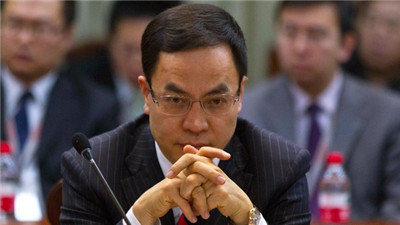(单词翻译:单击)
融资投资What can a bank offer the successful chief executive who has just listed his company and become a multimillionaire or billionaire? For financiers in Asia chasing closer ties to the region’s wealthiest people, the answer is proving simple enough: cash to bet on China’s soaring markets.
对于一位公司刚刚上市、已经成为百万富翁或亿万富翁的成功首席执行官来说,银行能为其提供什么?就追求与亚洲地区最富有人群建立更紧密关系的金融家而言,答案相当简单:为大亨提供现金,令其可以投资中国迅速飙升的股市。
Financing tycoons is a lucrative and growing business in Asia that is tempting investment banks including Goldman Sachs and Morgan Stanley to muscle in. They join a crowded field of existing players such as UBS, Credit Suisse and Citigroup, which all have big private banks.
在亚洲,为大亨融资是一个利润丰厚并迅速增长的业务,吸引着包括高盛(Goldman Sachs)和摩根士丹利(Morgan Stanley)在内摩拳擦掌的投行挤入。它们加入了这块原本已有瑞银(UBS)、瑞信(Credit Suisse)及花旗集团(Citigroup)等选手在内的拥挤竞技场,上述选手均拥有大型私人银行。

Lending on margin to retail investors is the rocket fuel powering the soaring markets in Shanghai and Shenzhen. Financing tycoons works on the same principle — banks make loans using shares as collateral and borrowers can be asked to top up if values fall — but the sums involved can be more than $1bn a pop. One senior investment banker calls it “one of the last juicy products out there”.
面向散户投资者的保证金贷款,是推动上海和深圳股市飙涨的“火箭燃料”。为大亨融资的原理相同——银行接受股票为抵押品发放贷款,如果股价下跌银行可以要求借贷者补足抵押品——但是每笔涉及金额可以达到10亿美元以上。一名资深投资银行家称之为“仅存的利润丰厚的产品之一”。
Banks everywhere lend on margin to hedge funds and private equity but in Asia, the rise of first and second-generation wealth makes tycoon financing a particularly attractive regional business because company founders can be worth billions on paper yet be short of cash.
世界各地的银行都向对冲基金和私募股权基金发放保证金贷款。但是,在亚洲,第一和第二代富人的崛起使得为大亨提供融资成为一个特别具有吸引力的地区性业务,这是因为企业创始人虽然账面财富可能达到数十亿但却仍然缺少资金。
“These companies are their babies but there’s a real need for these entrepreneurs to raise liquidity — and that’s what causes all these other banks to want to get into the business,” says one long-time specialist.
“这些企业都是他们的宝贝,但是这些创业家确实需要提高流动性——这也是为什么其他这些银行也都希望进入这个行业,”一名长期研究这方面的专家表示。
Li Hejun, China’s richest man by some counts until the shares in his group Hanergy Thin Film collapsed last week, is a case in point. Filings unearthed by the Financial Times show he pledged shares worth HK$5.8bn (US$747m) for a $200m loan just before the 47 per cent price fall.
李河君正是这样一个例子。按照某种统计,他曾是中国内地首富,直到上周其旗下集团汉能薄膜发电(Hanergy Thin Film Power)股价暴跌。英国《金融时报》掌握的文件显示,就在汉能薄膜发电股价暴跌47%前不久,李河君曾以价值58亿港元(合7.47亿美元)的股票作为抵押获得一笔2亿美元的贷款。
The latest tycoon-financing twist is lending for new investments, often generated by the bank doing the lending. “In Hong Kong, where we are seeing a lot of private placements, block trades and [floats], there is a real demand for this type of quick and opportunistic financing” says Sue Lee, Citi’s head of strategic equity solutions business for Asia Pacific.
为大亨融资的最新动向是为新投资放贷,通常这些新投资机会由操作贷款的银行带来。“在香港,我们看到了许多定向增发、大宗交易和(股票发行),确实存在对这种快速投机性融资的需求,”花旗亚太地区战略性股票解决方案业务主管Sue Lee称。
Providing tycoon financing can also help investment bankers win particular deals. Morgan Stanley managed a coup in this respect when last year it snatched the mandate for a $4.7bn private placement of shares in Ping An, the insurer from Goldman and Credit Suisse at the very last minute. The victory came because it offered enough financing to a tycoon in the 10-strong syndicate to help raise the price the whole group paid for the deal.
为大亨提供融资也可以帮助投资银行家赢得特定交易。摩根士丹利在这方面成功施展了一记妙招——去年其在最后一刻从高盛和瑞信手中抢走了保险公司平安(Ping An) 47亿美元定向股票增发的独家承销权。这次胜利的原因在于,摩根士丹利为包含约10位投资者的财团中的一位大亨提供了足够融资,从而帮助提高了整个财团为这笔交易支付的价格。
Putting one over on your rivals is always nice (and rare, in a deal of that size) but tycoon financing hits another banking sweet spot, namely making money by bringing together private bankers and traditional dealmakers. In theory, investment bankers unselfishly introduce newly minted millionaires, post-float, to their private banking colleagues. They bring in the investment banking team to advise on dealmaking. Real relationships are rarely that smooth, but finding a way for the investment bank to satisfy a private client’s need for funds to bet on shares is a quick win for both sides.
戏弄你的对手总是件乐事(在这种规模的交易中也实属罕见),但大亨融资还冲击了银行业的另一个获利点,也就是把私人银行家和传统的交易撮合者聚集起来以从中谋利。理论上,投资银行家无私地将公司上市后新出炉的百万富翁介绍给私人银行业的同行。后者也引入投资银行业团队为促成交易提供建议。现实中的关系鲜有如此顺利的,但找到一种办法让投资银行满足私人银行客户投资股票的资金需求,对双方来说都是速效的双赢局面。
Coalition, the data provider, estimates that in the past two years, revenue from corporate equity derivatives in Asia has totalled $1.2bn, up from $96m in 2012.
数据提供商Coalition估测,过去两年中,投行在亚洲的企业股权衍生品业务收入总额从2012年的9600万美元涨至12亿美元。
The growth has been fuelled by the rise of private wealth, particularly in China, with the floating of companies such as Alibaba. “The whole market dynamic is shifting from state-owned to private enterprises so you have this massive conversion of wealth and these entrepreneurs, after they float, are looking for liquidity,” said Aaron Oh, head of corporate equity derivatives for Asia Pacific at Credit Suisse. Typically banks will advance cash worth about 30 per cent of the borrower’s portfolio, but competition is reportedly spurring banks to lend up to double that.
随着阿里巴巴(Alibaba)等企业的上市,私人财富的增长推动了这种收入的增长,尤其是在中国。“整个市场动态正从国有企业转向私有企业,因此你看到了这种大规模的财富转换,在企业上市后,这些企业家正在寻求流动性,”瑞信亚太区企业股权衍生品主管Aaron Oh表示。通常银行会借出约为借款者资产组合价值30%的现金,但据报竞争已经促使银行最高借出两倍于此的资金。
Backing tycoons in the bullish Chinese market is unlikely to keep bankers awake at night. Investors too are buying into the concept at a retail level: China’s brokerages have raised equity worth $14bn in Hong Kong this year and plan to use much of it to fund more margin financing.
在中国股市处于牛市的情况下,向大亨们出借资金不大可能让银行家们夜不能寐。散户投资者也接受了这一概念:中国的券商今年在香港发行了价值140亿美元的股票,计划将大部分募得资金用于加大融资业务。
The real question is what will happen when markets suffer a correction. Retail investors may have trouble meeting the resulting margin calls. Tycoons should be better able to keep their cool, so long as their bankers do too.
真正的问题是当市场遭遇调整时会发生什么。散户投资者或许难以满足由此而产生的保证金追加要求。大亨们应该比他们更能保持冷静,只要他们的银行家能够保持冷静。


